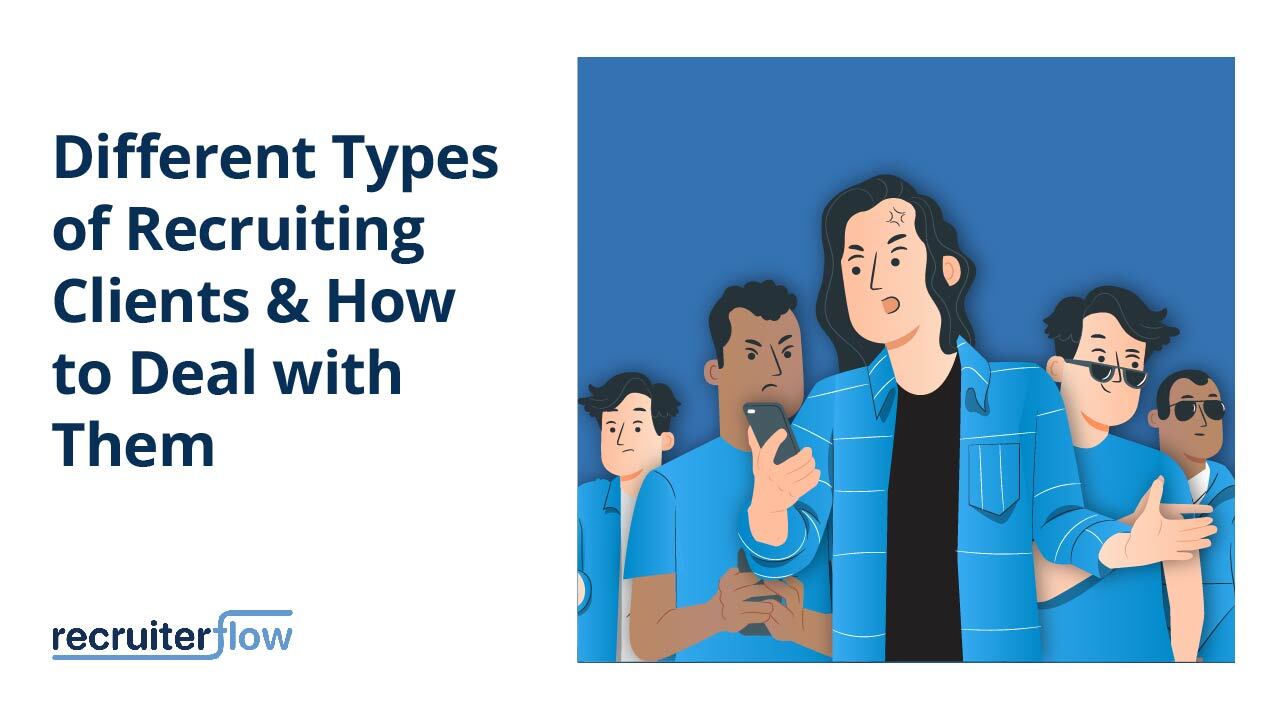
7 Recruiting Client Challenges and How to Deal With Them

In the competitive world of recruitment, your recruitment agency’s success often hinges on the partnerships you form with clients.
However, not every opportunity is a perfect match!
Some clients may have very different work ethics from yours, while others may not align with your agency’s values or processes. This can lead to many wasted hours on unproductive tasks and problems and hinder your agency’s growth.
Identifying these recruiting client challenges early on is crucial for safeguarding your agency’s time, growth, and overall success.
In this blog, we’ll explore seven recruiting client red flags and offer practical strategies for dealing with them effectively.
1. Lack of empathy or consideration for mutual success
New agencies might encounter clients who approach the relationship as a zero-sum game, i.e. winning at any cost. These are the types of clients who are generally more focused on achieving aggressive growth targets and view recruitment as a means to an end rather than a strategic partnership.
Let’s take an example.
Mia, the CEO of an eCommerce startup, expects a recruitment agency to hire candidates quickly and at a minimal cost without considering the complexities of the hiring process or the need for a tailored approach to find the right fit.
She pressures the agency to expedite the hiring process and reduce the time to fill, overlooking crucial steps such as comprehensive interviews and reference checks.
In the end, the rushed hiring process results in several mismatches, and Mia puts all the blame on the agency for the high turnover among new hires.
How to deal with them?
Make sure to emphasize the collaborative nature of recruitment.
Foster a culture of transparency and shared goals. Create open communication channels where both parties can freely discuss their expectations, concerns, and feedback. Also, establish regular check-in meetings with the client to provide updates on the recruitment progress, share insights on candidate profiles, and gather feedback on the suitability of candidates presented.
This level of transparency ensures that both parties are aligned throughout the process and allows for real-time adjustments to the client’s evolving needs.
Also, communicate the benefits of a win-win partnership. Establish key performance indicators (KPIs), such as retention rates, candidate satisfaction, and recruitment metrics such as time to fill, time to hire, etc, that can lead to better outcomes for both parties. You can also share success stories from past collaborations, showing how working closely with past clients has resulted in high-quality hires who are also an excellent fit for the company culture.
Recruiting expert Stephanie Ranno says, “When relationships are at the center, staffing and recruiting firms really can be an extension of their client’s talent acquisition team and specific departments or disciplines with whom they work.”
2. Awkward payment-related encounters
According to a survey, about 13% of recruitment agencies cite cash flow as their number one business challenge. And payment-related problems (mainly payment delays) are often the most common reason.
Some clients may disregard payment terms, delay payments, or attempt to negotiate fees beyond reasonable boundaries. For recruitment agencies operating on a performance-based model where success directly impacts compensation, such clients can strain your cash flow and compromise your agency’s financial stability.
To ease these challenges, agencies should accept payment online to make the process quicker and more convenient for clients
How to deal with them?
The key is to hold your ground with such hard negotiators. Such clients are indeed tricky to negotiate with.
- Make sure not to sell yourself short just to get a new client.
- Resist offering hefty discounts. Instead, spin the spotlight on your services. Shine a light on the distinctive facets your agency brings to the table. Highlight the features, benefits, and overall value of your services.
- Set clear expectations. Have a chat about the project scope and possible cost changes before starting the recruitment journey with them. Agree beforehand on any additional work. This upfront approach will leave no scope for future negotiations.
- Offer them multiple payment options—bank transfer, credit and debit cards, e-wallets and so on—to make it easy for your clients to pay their invoices.
- Credit checks with your potential clients to track changes in their financial status and understand how likely they are to pay your invoice on time.
3. Ambiguity with the recruitment process
When clients exhibit ambiguity regarding critical aspects of the recruitment process, it creates challenges that can hinder your recruitment process. These ambiguities could be:
- Uncertainty about submission deadlines that makes it a challenge to prioritize tasks, resulting in delays in candidate sourcing, screening, and submission.
- Unclear interview parameters, such as required skills, experience levels, or cultural fit criteria, can impede the selection process and result in a mismatch between candidates and the client’s expectations.
How to deal with them?
Navigating the ambiguity of clients unsure about their recruitment needs demands a thoughtful approach. Here’s a step-by-step guide for you:
Step 1: Conduct thorough onboarding sessions
- During your onboarding process, make sure clear contracts are in place outlining terms, fees, and expectations for both parties.
- Schedule a kick-off meeting to ensure alignment and mutual understanding. During the meeting, take the opportunity to introduce the agency team to key client contacts, fostering a sense of familiarity and trust. Discuss the scope of the recruitment project, timelines, and any specific requirements or preferences the client may have.
- Understand the client’s needs and actively listen to the client’s challenges, pain points, and goals related to recruitment. Take note of the technical aspects of the role to be filled while keeping in mind the cultural fit, team dynamics, and any unique considerations specific to the client’s industry or organization.
Step 2: Encourage questions and clarifications
Establish a communication protocol that swiftly addresses uncertainties. Ensure that no question or doubt stays unresolved. Provide them with educational resources on the recruitment process if needed.
Step 3: Develop a detailed project plan
- Conduct a strategic assessment of the client’s recruitment landscape, understanding their objectives, challenges, and long-term goals. This involves analyzing the organization’s culture, talent gaps, and strategic priorities to tailor our approach effectively.
- Implement a structured recruitment plan encompassing various stages, including advertising job vacancies through diverse channels, reviewing CVs and applications, conducting thorough screening interviews, and presenting the client with a shortlist of highly qualified candidates.
Step 4: Implement a feedback loop
This feedback loop operates as a two-way communication channel, allowing the client to provide input on the effectiveness of our recruitment efforts and the quality of candidates presented. It’s also an opportunity for you to share updates, address any concerns, and solicit suggestions for improvement.
Also, check our blog on recruitment strategies to attract the best talent.
4. Clients undervaluing candidate compensation
When clients offer below-market compensation, candidates may push back or negotiate for higher salaries, leading to prolonged negotiations and delays in the hiring process.
These candidates may lose interest in the job opportunity altogether, leading to a smaller pool of qualified candidates for the client to choose from. This reduces the agency’s ability to deliver high-quality candidates and can prolong the recruitment process.
Moreover, candidates who perceive unfair compensation offers may develop negative perceptions of both the client and the recruitment agency. This can damage the agency’s reputation as candidates share their experiences with others in their professional network, leading to decreased trust and credibility for the agency.
How to deal with them?
- Hit them with the reality of the current job market through market insights and salary surveys. You can also offer them creative solutions to meet their budget constraints without compromising on candidate quality. This can involve suggesting alternative payroll structures such as performance-based bonuses, equity options, or flexible work arrangements.
- Showcase case studies of impacts of fair compensation practices to convince your clients to increase the pay compension. These real-world examples explain the positive impact fair compensation has on attracting high-quality candidates and, more importantly, retaining them in the long run.
- Develop a standardized salary benchmarking process to keep up with changing market dynamics and ensure your client’s compensation packages remain competitive.
Also Read: How Recruiters can Convince Clients to Increase Candidate Pay
5. Rude or abusive behavior toward your team
Tolerating rude and abusive behavior from clients isn’t what you and your team sign up for! It creates a toxic work environment that can negatively impact team motivation, productivity, and job satisfaction.
Some examples of such behavior include:
- Resorting to shouting, insults, or derogatory language when communicating with agency staff.
- Belittling or demeaning agency employees, dismissing their expertise, or refusing to acknowledge their contributions.
- Habitually blaming agency staff for problems or setbacks, refusing to take responsibility for their own actions or decisions.
How to deal with them?
- Set clear boundaries and standards of conduct for client interactions for respectful collaboration and mutual respect.
- Address concerns diplomatically but assertively. For instance, if a client uses inappropriate language, calmly express that maintaining a respectful tone is crucial. Or, say, a client continuously disregards agreed-upon timelines. Politely remind them of the agreed schedule and its impact on the recruitment process.
- If abusive behavior persists, terminate the client relationship.
6. Unreasonable demands from the client
When clients make unreasonable demands or continuously push the boundaries of the agreed-upon terms, it impacts your ability to deliver high-quality service and achieve your financial goals.
Consider a scenario where a client demands a full refund months after hiring, citing dissatisfaction with the candidate’s performance. Or when a client requests additional candidate screenings, extended candidate guarantees, or customized recruitment solutions without being willing to pay additional fees.
These unexpected demands can result in financial loss for your agency and consume valuable time and resources that could have been allocated to other clients.
How to deal with them?
- Clearly define the scope of services in your agreements and establish clear parameters with clients about your services.
- Whenever they come up with an additional request, clarify the logistical implications.
7. Clients resorting to threats
Recruitment agencies rely heavily on their reputation and credibility to attract clients and candidates. Any threat of public criticism or defamation can have far-reaching consequences. This behavior not only diverts your agency’s focus from core operations but also damages your reputation and credibility.
How to deal with them?
- When faced with threats of social media complaints or negative reviews, it’s essential to address them promptly and professionally. This involves actively listening to the client’s concerns, empathizing with their perspective, and offering solutions or remedies to resolve the issues.
- Keep detailed records of all your client communications. This includes emails, phone calls, and meeting summary documenting the client’s concerns, proposed solutions, and any follow-up actions you take.
- Gather feedback from satisfied clients and encourage them to share their positive experiences on social media platforms, review sites, and industry forums.
- If a client posts a negative review on social media, address their concerns publicly and be as transparent as possible. Make sure to use your positive reviews, case studies and strong work ethics for damage control.
- If the problem escalates, seek legal advice to protect your interests and mitigate potential risks.
Managing recruitment clients effectively with RecruiterFlow
To run a successful recruiting business, it’s crucial to maintain integrity and professionalism in all client interactions, even in challenging situations. The key is to establish clear boundaries with your clients and be upfront about your concerns as well.
RecruiterFlow can help you manage client relationships effectively by enhancing collaboration and streamlining communication with your clients. With features like a dedicated client portal and collaborative selling, you can share real-time updates with your clients and offer the best experience.
Sign up for a free trial today!


